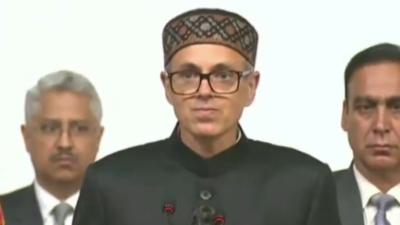

SRINAGAR, NOVEMBER 05: On the second day of ongoing Assembly Session of the Jammu and Kashmir Legislative Assembly, Chief Minister Omar Abdullah paid rich tributes to a number of distinguished former leaders, including former President of India Pranab Mukherjee, former Prime Minister Atal Behari Vajpayee, and various members of the Jammu and Kashmir Legislative Assembly and Council. In his obituary address, the Chief Minister reflected on each leader’s legacy and contributions to India and the region.While delivering his tribute to former President Pranab Mukherjee, the Chief Minister, who is also Leader of the House, lauded Mukherjee’s dedication and principles throughout his political career.“His life is a great lesson, and we should all learn from it,” Omar Abdullah said. “From his humble beginnings as a Deputy Minister to becoming the President of India, he shouldered immense responsibilities with integrity and hard work. Pranab Mukherjee had no godfather and no shortcuts; he demonstrated his capability at every level. As President, he kept Rashtrapati Bhawan above politics, using it only to serve the country’s betterment,” he said in his obituary reference speech. In his tribute to former Prime Minister Atal Behari Vajpayee, Abdullah shared personal insights from his time working alongside him as a Minister of State.“I had the privilege of working closely with Vajpayee ji for three years. His dedication to stabilizing Jammu and Kashmir was unwavering,” Omar Abdullah noted. “Whenever we remember Vajpayee ji in the context of Jammu and Kashmir, it’s clear he always worked tirelessly to improve the situation here. Despite the challenges of violence, tension, and the complex relationship between India and Pakistan, he made sincere efforts to foster peace,” he maintained. The chief minister recollected the famous cross border bus service between India and Pakistan and said the former Indian premier was the first leader to take the bold step of visiting Lahore by bus, initiating the Delhi-Lahore Bus Service. “During that trip, he even visited Minar-e-Pakistan, a challenging gesture from any Indian leader. At the border, he famously stated, ‘Friends can change, but not neighbours.’ I doubt that in today’s climate, anyone would say such a thing,” Omar recalled. The Chief Minister praised Vajpayee’s initiatives aimed at bridging the gap between Kashmir and the rest of India, citing his well-known commitment to “Insaniyat, Jamhooriyat and Kashmiryat” (humanity, democracy, and the Kashmiri identity). “Whenever Jammu and Kashmir faced difficulties, he consistently advocated for dialogue as the path to peace. Despite facing significant obstacles, he extended a hand of friendship. When he spoke about Jammu and Kashmir, he emphasized ‘Insaniyat, Jamhooriyat, and Kashmiriyat’—humanity, democracy, as the essence of Kashmir,” he said about Vajpayee’s tenure as PM.Omar said that Vajpayee had believed that people on both sides of the divided Jammu and Kashmir should meet, and he opened roads to facilitate that connection.“Sadly, those roads have since been closed, and it seems today that there’s an effort to widen the gap rather than bridge it,” he added. The chief minister said that if we had followed the path outlined by Vajpayee ji, we might not have been in the difficult situation we face today. “He is gone, and with him, we seem to have lost our direction,” he said.The Chief Minister Omar Abdullah reflected on the autonomy resolution passed by the Jammu and Kashmir Assembly, which was subsequently returned by the central government.He noted that while the resolution was initially rejected, former Prime Minister Vajpayee later acknowledged that the decision may have been made hastily.In response, Omar said, Vajpayee appointed Late Arun Jaitley as the minister to initiate dialogue with Kashmir, signaling a willingness to engage on the matter.“It’s true that the Autonomy Resolution passed by the Jammu and Kashmir Assembly was sent back by his government. However, he later felt it was done in haste, which is why he appointed a cabinet minister to initiate dialogue on the matter. At that time, the late Arun Jaitley, who was the Law Minister, was tasked with starting discussions on the resolution,” Omar said and added that with “Vajpayee ji’s intentions for Jammu and Kashmir, we had no contradictions—his commitment to peace and dialogue was unquestionable.” Omar also remembered former Lok Sabha Speaker Somnath Chatterjee as a figure of great integrity. “Chatterjee ji was a politician who lived by his principles, a rarity in today’s politics. His legacy of steadfast values and commitment to the people is something we should all aim to emulate.”In a heartfelt remembrance of Devender Singh Rana, the sitting MLA of Nagrota, Abdullah reflected on their two-decade association. “I spent considerable time with him; he was first my media advisor in 2002 and later an advisor during my tenure as Chief Minister.From working at a Maruti workshop to building a successful automobile business empire, he exemplified the power of hard work and ambition. He took on party responsibilities with dedication and excellence.”Expressing personal regret, he added, “I didn’t know he was so unwell. Had I known, I would have made efforts to reconcile our differences. Now, his absence leaves a lasting sorrow.”The Chief Minister also paid respects to the broader group of 57 leaders being remembered in the assembly, many of whom he had known personally or professionally.“Among these departed, I have known 45 of them, either directly or indirectly. Each one has made invaluable contributions to Jammu and Kashmir. Their service is something we should learn from and be inspired by.”While concluding, the CM emphasized the importance of honouring these leaders by carrying forward the values they stood for, drawing lessons from their dedication, principles, and service to Jammu and Kashmir and to India as a whole
